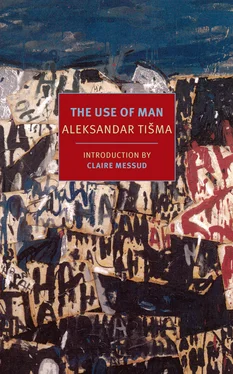Aleksandar Tišma - The Use of Man
Здесь есть возможность читать онлайн «Aleksandar Tišma - The Use of Man» весь текст электронной книги совершенно бесплатно (целиком полную версию без сокращений). В некоторых случаях можно слушать аудио, скачать через торрент в формате fb2 и присутствует краткое содержание. Год выпуска: 2014, Издательство: NYRB Classics, Жанр: Современная проза, на английском языке. Описание произведения, (предисловие) а так же отзывы посетителей доступны на портале библиотеки ЛибКат.
- Название:The Use of Man
- Автор:
- Издательство:NYRB Classics
- Жанр:
- Год:2014
- ISBN:нет данных
- Рейтинг книги:5 / 5. Голосов: 1
-
Избранное:Добавить в избранное
- Отзывы:
-
Ваша оценка:
- 100
- 1
- 2
- 3
- 4
- 5
The Use of Man: краткое содержание, описание и аннотация
Предлагаем к чтению аннотацию, описание, краткое содержание или предисловие (зависит от того, что написал сам автор книги «The Use of Man»). Если вы не нашли необходимую информацию о книге — напишите в комментариях, мы постараемся отыскать её.
A work of stark poetry and illimitable sadness,
is one of the great books of the 20th century.
The Use of Man — читать онлайн бесплатно полную книгу (весь текст) целиком
Ниже представлен текст книги, разбитый по страницам. Система сохранения места последней прочитанной страницы, позволяет с удобством читать онлайн бесплатно книгу «The Use of Man», без необходимости каждый раз заново искать на чём Вы остановились. Поставьте закладку, и сможете в любой момент перейти на страницу, на которой закончили чтение.
Интервал:
Закладка:
The town spread out before him, gray with dust, resigned, the walls of its old houses marbled with moisture. Creaking and groaning, a streetcar took him to the center. Opposite the stop was the Queen Mary Hotel, now called the Vojvodina, and he took a room there. The porter, drawling in a way Sredoje had long lost the habit of, asked how many days he was staying. Sredoje didn’t know. The porter told him that he could not stay more than five days — that was the regulation. The town, which Sredoje had once considered lively, and in the rush of the Liberation wild, now seemed abandoned, sleepy. He went to his parents’ house. It had, again, new occupants, who were scornfully indifferent to his announcement that he intended to reclaim his right of ownership. He went to the Town Hall. The official he had to see was not there.
He made several trips with the same lack of success. When he grew angry and began to shout, an aged clerk, looking at him over his spectacles, outlined in vengeful detail the kind of petition that had to be submitted. All this Sredoje did, but no one could tell him how long it would be before he received an answer. His time in the hotel had run out and his money was rapidly dwindling; he had to look for accommodations. Subconsciously his steps led him to the places he had frequented in his youth, and soon he found himself in front of the house of Milinko Božić. He went in, but was told that his friend had not returned from the war and that Mrs. Božić had remarried and not long ago moved away.
Wandering around uncertainly, Sredoje arrived at Fräulein’s lodgings, passed them, and in a decrepit little back street not far away caught sight of a handwritten sign: “Subtenant wanted.” He went in and, since a month’s rent was less than three nights in the hotel, took a furnished room. The landlord was a peasant with a mustache and a potbelly, who had sold his land and bought this house in order to send his two sons to school in the town and avoid paying taxes; he worked as a night watchman in a factory. Sredoje spent his days in the courtyard in front of his unheated room (to save money) and ate cold food, which he bought from the shop next door. With nothing to do, and almost against his will, he observed the life of the small community: the tiny but wiry lady of the house, old before her time; who cooked and kneaded in the kitchen; her scrawny sons, one ten and the other twelve, reluctantly doing their homework under the trellis; the two subtenants and the landlord, who came home from work at different times, ate, slept, then went back to work again, they in the morning, he in the evening.
Out of boredom, Sredoje would occasionally correct the children as they read aloud and recited uncomprehendingly; he would explain to them or drill them. The landlord, at his wife’s prodding, came to him one afternoon and asked if Sredoje would coach the children regularly until the end of the school year, and in return offered to put him up rent-free. Sredoje at once accepted. But he had no money now to buy food; so he wrote to Dominika and meanwhile borrowed some cash from the landlord. Dominika sent him money and a letter in which she asked him to return immediately and find work; he could no longer count on her assistance because she was soon to give birth.
Instead of answering her letter, he went to the Town Hall again. This time he found a helpful official, an educated young shopkeeper-turned-clerk, who, after patiently rummaging through the papers on his desk and in a file cabinet, found a document he was looking for, read it, his two plump hands clutching his forehead, and finally said that Sredoje needed to support his claim by the affidavits of two witnesses. Sredoje went in search of people who had known his parents. Most of them were no longer around — they either had left the town or were dead — and the only ones he could come up with, a retired civil servant and the widow of a prewar officer, refused to appear as witnesses for fear their testimony would be viewed as an attack on property that was now state owned.
On the horns of this dilemma, Sredoje decided to seek the aid of a lawyer. He remembered a name, Dr. Karakašević, learned from the telephone directory that he was still practicing, and went to see him. The small, balding old man, whom he had never seen before, received him far more cordially than anyone else had done, but when Sredoje finished explaining, he shook his head: “No, young man. I would never take up a cause that is already lost. This state gives nothing back.” Sredoje left the lawyer, dejected, and abandoned his claim.
But he did not return to Celje. He continued to work with his two charges and waited, as if spellbound by indecision and the sudden onset of the hot, oppressive summer of the plain. As a result of Sredoje’s efforts, the landlord’s younger son passed all his final exams and the older son improved several poor grades, failing only his exam in history. Sredoje went on coaching him, and parents from the neighborhood, unschooled, unfamiliar with book learning, and worried by their children’s lack of success in competition with the children of the old middle class, started to bring their own confused sons and daughters to him for instruction. Sredoje began to support himself.
In August, just before the school placement exam, a telegram arrived for him: Dominika had had a daughter and was asking him to come home. He put off the decision until the exams were over, and then, since he had remained silent for so long, could not decide to break his silence. (Several years later, he would receive another letter from Dominika, with a photograph of a round child’s head and a message: “To Daddy on my fourth birthday — Vali.” He would often look at the photograph when he was drunk.) In the autumn he continued to coach the pupils whom he had helped through the placement exams, along with a few new pupils. Every day he spent seven or eight hours over their untidy notebooks. In his free time he rested in his room, or went out for walks, though rarely. On one such walk, his eyes were drawn to the silhouette of a woman ahead of him. Her slightly stooping gait seemed familiar. Then, seeing the red cascade of her hair, he knew that it was Vera Kroner. He ran up to her and took her in his arms.
23
On his first visit to Vera, Sredoje presented her with Fräulein’s diary. She was thrilled; she grabbed the little red book, opened it, pressed it against her chest, but Sredoje retrieved it from her for long enough to show her the place that had caused him to take it and keep it: Vera’s own entry, with the date and circumstances of Fräulein’s death. Vera looked at it, said that the handwriting, although she didn’t deny it was hers — she remembered well that she had written it — was strange, completely unlike her present style. She wanted to show him. She looked around for a piece of paper, asked him for a pencil, and sat down to write. Leaning over her as she wrote, he insisted that she was wrong, that the two scripts were the same. They fought over the piece of paper — he trying to take it, she not letting him — until they almost tore it in half. They laughed, they were like children, teasing and chasing around the table, and when they caught each other, they forgot what they intended to do, lost their breath, fell on the couch, on the floor, with their arms entwined, and kissed.
They kissed for hours. Sredoje pressed a thousand slow kisses on Vera’s hair, shoulders, arms, and, with special tenderness, the indelible black letters on her breast, which Vera for the first time made no attempt to hide. Lowering her rust-colored eyelashes and with a lost look, her face pale, she accepted and counted silently those thousand kisses, each the same, each different. Her blood did not quicken, nor did his; rather, it was as if, thirsty, they were drinking of some bottomless cool liquid, which left them with a greater thirst. Their chasteness amazed them, and again they laughed like children as they lay in each other’s arms for hours, kissing without desiring, without demanding that their embrace culminate in the way they had both long ago mastered.
Читать дальшеИнтервал:
Закладка:
Похожие книги на «The Use of Man»
Представляем Вашему вниманию похожие книги на «The Use of Man» списком для выбора. Мы отобрали схожую по названию и смыслу литературу в надежде предоставить читателям больше вариантов отыскать новые, интересные, ещё непрочитанные произведения.
Обсуждение, отзывы о книге «The Use of Man» и просто собственные мнения читателей. Оставьте ваши комментарии, напишите, что Вы думаете о произведении, его смысле или главных героях. Укажите что конкретно понравилось, а что нет, и почему Вы так считаете.












